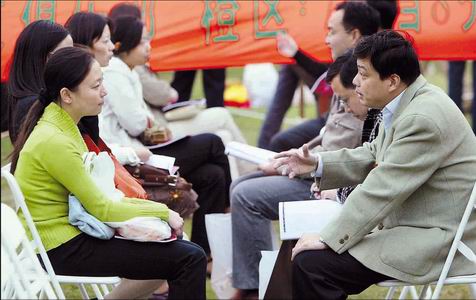
Participants in the speed-dating section of the
matchmaking party in Zhongshan Park. The city¡¯s biggestever matchmaking
event attracted more than 4,000 young Shanghainese ¡ª and many of their
parents.(Photo: Shanghai Daily)
Parents' Blind Date for Single Children
You may often
enjoy parties on weekends or during holidays, but imagine a grand gathering of
3000 couples with banners framed along with colorful photos and personal
statements. What people in the eastern China's city of Nanjing will see on
Saturday, November 12, is such a party, but with parents' blind dating for their
single children, according to China Youth Daily. The newspaper reported Friday
that such gatherings of parents have been flooding major Chinese cities like
Beijing, Tianjin, Shanghai, Hangzhou, Chongqing and Shenzhen.
For the
Saturday gathering in Nanjing, enrollment began on November 7, 2005, with many
anxious parents rushing into the organizer's service center.
Xu Xiaoming,
the gathering's event planner, said in an interview that the staff was extremely
busy answering phone calls from early in the morning, and ended pre-registration
with more than 3,000 parents signing up their children's names.
The planner
said women outnumber men in the group at a ration of two to one. Some parents
even signed up their college children, with the youngest girl being 20 years old
.
Parents said that they would bring their children along to the Saturday
gathering in a park, according to the newspaper.
The newspaper reported that
Japan has been providing parents with the blind dating service for their
children for more than 20 years in the country's capital of Tokyo.
In China,
Beijing was the first to pilot this kind of parents gathering.
The Beijing
Evening News reported in September 2004 that a similar event was held at Longtan
Park. The initiator, a Ms. Wang, called on parents in the capital to gather in
Longtan, Zizhuyuan and Zhongshan Parks at a specific time.
Shanghai followed
suit in organizing such parents gathering for their children through local
matchmakers.
According to Xu Xiaoming, the Shanghai Municipal Women's
Federation announced in early October this year that such a gathering would help
30% of the participants find the right dates, compared to the less than 10% of
successful matches through commercial matchmakers in the city.
Shanghai Kicks off Grand Roman 2005
Meanwhile, in
China's biggest commercial city, nearly 4000 white-collared men and women
gathered in a park, according to China Youth Daily newspaper.
The gathering,
dubbed "Grand Romance 2005" divided into different groups, namely participants
born in the early-1970s, mid-1970s, and 1980s.
The 8-minute dating topped
the other events, with lots of men gathered around the group of 1980s
group-members. Parents accompanying their children were in high spirits outside
the group party, after seeing optimistic and satisfactory facial expressions on
their single children's faces.
All participants were numbered, with a
booklet dubbed "Secret to Romance". Parents were eager to find targets for their
children. A mother accompanying her daughter said that it seemed participants
were presented better than the alternative commercial matchmaking services.
A young German man, who teaches in Shanghai, also joined in the gathering,
saying that such a blind dating events are common for young people in his
hometown.
China Meets Third Singles' Crisis
The newspaper also
claimed that China is suffering a singles' crisis, quoting experts as saying
that Chinese people are experiencing an ideological revolution in terms of
marriage and family matters.
Wang Zhenyu, Deputy Director of Sociology
Studies at the Chinese Academy of Social Sciences said that nowadays, young
people don't think it as a necessity to get married. Being single, he says, is
seen now as an optional way of life.
Dr. Chen Huiping from the Women's
Studies Institute with All China Women's Federation said that the previous
singles' crisis, in the early 1950s and late 1970s and early 1980s,
respectively, in the country were largely due to social factors, but now it
reflects the changing values among the younger generations.
Many singles
have chosen to remain unmarried, Dr. Chen noted, differing from previous
generations.
Director Wang with the Sociology Study Institute analyzed that
the younger generation does not intend, to some extent, to become engaged or get
married, while their parents are eager to see them start a family at what they
consider a proper age.
Ms. Chen Xinxin from the All-China Women's
Association commented on the current situation, saying that a social sense of
crisis for the increasing numbers of singles dominates over their personal
lives. Young people have many more options in life, and choose not to follow the
traditional Chinese culture of getting married at a certain age. Besides,
today's people have developed various expectations for marriage and family life.
These singles are joining singles' clubs, bars, group tours, among many others
options in urban areas.
Single white-collard women are on the rise,
according to Ms. Chen Xinxin. A 26-year-old-girl, working at an accounting firm,
said she is like many other single women busy with office work, having no time
to find, and date their boyfriends.
Another expert, Hao Maishou said that
single women, especially professional women, have difficulty in finding their
life partners. One reason is that they missed the chance to do it at an earlier
age because of the burden of schooling or career development. Another reason is
that many successful women desire to marry even more successful men.
Dr Chen
Huiping from the All-China Women's Federation said that marriage will remain the
norm in the Chinese social life. As for a single lifestyle, she noted that such
a way of life should not be encouraged but treated with respect. After many
years of being single, many of them will eventually choose to get married in
their 30s, Dr. Chen has concluded from her research and social
observations.



